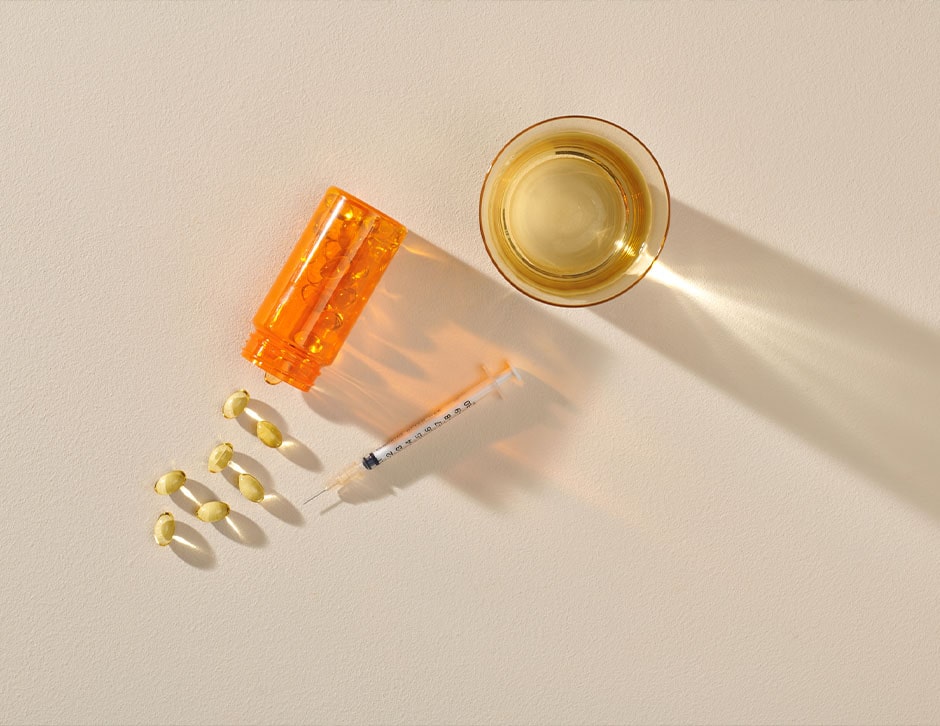
Here’s what we’ll cover in this blog post:
- What medications interact with GLP-1s
- Whether it’s safe to take these medications with GLP-1s
- How to stay safe with on GLP-1 therapy
GLP-1 receptor agonists, such as Semaglutide and Tirzepatide, have made managing weight loss and blood sugar levels much simpler.
However, if you’re considering GLP-1 therapy, it’s crucial to understand how these medications can interact with other treatments, particularly oral contraceptives, hypertension medications, and thyroid therapies.
Here, we’ll help you navigate these interactions for safer and more effective treatment.
Key Issues to Consider with GLP-1 Medications
1. Impact of GLP-1 Medications on Oral Contraceptives (birth control pills)
GLP-1 medications work by slowing down the gastric emptying process, meaning it takes longer for food—and oral medications like contraceptives—to be absorbed into the bloodstream. This slowed absorption can reduce the effectiveness of oral contraceptives, increasing the risk of unintended pregnancies.
This phenomenon has been coined “Ozempic babies” on social media and news outlets, and also refers to the increased fertility of female patients using GLP-1 medications.
What to Do:
- Discuss alternative contraceptive methods such as an IUD or patch with the doctor who prescribed your birth control
- Consider additional protection, especially in the early phase of GLP-1 therapy, such as barrier protection (condoms)
- Avoid sex during ovulation, thereby reducing the risk of pregnancy
2. How GLP-1 Medications Affect Blood Pressure in Patients with Hypertension
Weight loss often leads to a decreased need for blood pressure medications, which can pose risks for patients who are currently on anti-hypertensive medications (blood pressure pills). As you lose weight with GLP-1 therapy, your blood pressure may drop, increasing the risk of hypotension (low blood pressure) and symptoms like dizziness, fainting, and syncope.
The Most Common Blood Pressure Medications:
- Lisinopril
- Amlodipine
- Losartan
- Olmesartan
- Telmisartan
- Metoprolol
- Hydrochlorothiazide (HCTZ)
What to Do:
- Notify your healthcare provider if you’re taking anti-hypertensives
- Regularly monitor your blood pressure to avoid dangerously low levels – buy a cuff to use at home if needed
- Work with your doctor to adjust your anti-hypertensive medications as your weight changes
3. Thyroid Medication and GLP-1 Therapy
If you’re on thyroid medications such as levothyroxine, liothyronine, or desiccated thyroid extract, weight loss from GLP-1 therapy could increase your risk of hyperthyroidism. This occurs when your thyroid medication becomes too potent as your body mass decreases, leading to symptoms like heart palpitations, racing heart, anxiety, and insomnia.
The Common Blood Pressure Medications:
- Levothyroxine (Synthroid)
- Liothyronine (Cytomel)
- Desiccated thyroid extract(Armour, NP Thyroid)
What to Do:
- Consult your prescriber before starting GLP-1 therapy
- Watch for symptoms of hyperthyroidism and report any issues to your doctor
- Regularly check your thyroid hormone levels with the doctor who prescribes your thyroid medication to adjust your medication dosage as needed
Why Regular Monitoring Is Essential
Regardless of which other treatments you’re on, regular monitoring is crucial when starting GLP-1 therapy. This ensures that any changes in your weight or metabolism are managed safely, reducing the risk of adverse interactions with other medications. Always consult your healthcare provider to make sure your treatments are properly aligned.
Staying Safe While on GLP-1 Therapy
GLP-1 medications like Semaglutide and Tirzepatide offer significant benefits, especially for weight loss and blood sugar management. However, patients taking other medications for contraceptives, blood pressure, or thyroid function need to take additional precautions. By working closely with your healthcare provider, you can minimize risks and enjoy the full benefits of your GLP-1 treatment.
For more information or personalized advice, talk to your healthcare provider or contact a member of our AgelessRx team.
Note: The above statements have not been evaluated by the Food and Drug Administration. This product is not intended to diagnose, treat, cure, or prevent any disease.
